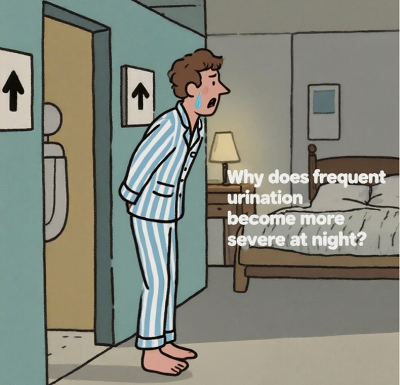Why Does Frequent Urination Caused by Chronic Prostatitis Worsen at Night?
For many patients with chronic prostatitis, frequent urination is a persistent nuisance that significantly impacts their daily lives. What's particularly frustrating is that this bothersome symptom becomes especially noticeable during the late-night hours. Why does prostatitis-induced urinary frequency specifically intensify at night? Understanding the underlying reasons is crucial for developing more effective treatment plans and helping patients improve their quality of life. Below, we will explore the causes together.

Factors Contributing to Worsened Nocturnal Urinary Frequency in Prostatitis

1. Heightened Focus: With the distractions and busyness of daytime gone, the quiet nighttime environment makes it easier for people to concentrate entirely on bodily discomforts, particularly the sensation of urinary frequency. This focus can amplify the perception, making it more noticeable the more one tries to ignore it.
2. Psychological Factors: Anxiety and irritability often intensify at night. This state of "mental unease" can heighten bladder sensitivity through what is known as the "brain-pelvic floor axis," creating a vicious cycle where "the more one fears frequent urination, the more frequently it occurs."
3. Vagus Nerve Excitation: At night, the vagus nerve generally becomes more active in most people, leading to increased detrusor muscle tone and contraction frequency in the bladder. As a result, the bladder's urine storage capacity diminishes.
4. Nocturnal Involuntary Spasms of Pelvic Floor Muscles: In many patients, after falling asleep, the pelvic floor muscles involuntarily experience "cramp-like" spasms. This increases resistance at the bladder neck, obstructing complete urine voiding. The resulting residual urine volume repeatedly irritates the bladder wall, triggering recurrent urges to urinate.
5. Reduced Melatonin Secretion: Chronic inflammation in the body affects a small brain structure called the pineal gland, reducing its secretion of melatonin (which aids sleep and also stabilizes bladder function). With insufficient melatonin, the bladder's "relaxation" capacity weakens—failing to properly dilate when needed—naturally impairing urine storage.
6. Abnormal Nocturnal Elevation of Cortisol: Inflammation leads to elevated nighttime cortisol levels, consequently increasing nocturia frequency. This occurs because cortisol directly stimulates contractions of the bladder's smooth muscle, intensifying urinary urgency.
7. Accumulation of Inflammatory Mediators: Assuming a supine position at night reduces pelvic lymphatic flow velocity, causing concentrations of inflammatory factors (e.g., TNF-α, IL-8) to rise compared to daytime levels. These mediators irritate the bladder mucosa, thereby increasing nocturia.
How to Treat Nocturia Caused by Prostatitis
1. Pharmacological Treatment
Administering α-blockers (e.g., tamsulosin) after dinner allows peak plasma concentrations to cover the nocturnal symptom window (23:00–2:00), proving more effective in reducing nocturia compared to morning dosing. However, patients must be cautioned that these medications may dilate anal blood vessels, potentially exacerbating hemorrhoidal bleeding, thus requiring close monitoring and dose adjustment.
Taking bladder stabilizers (e.g., mirabegron) at bedtime helps relax the detrusor muscle while minimizing central side effects (e.g., dry mouth, constipation), effectively decreasing nighttime voiding frequency.
Traditional Chinese medicine Diuretic and Anti-inflammatory Pill offers comparable efficacy and target the root causes of prostatitis, helping alleviate nocturia more fundamentally.
2. Physical and Behavioral Therapies
Fluid management strategy: Patients should distribute 70% of their daily fluid intake before 16:00 and restrict consumption within 3 hours of bedtime, maintaining total daily volume ≤2L (while avoiding dehydration).
Sample regimen: 500ml upon waking + 500ml pre-lunch + 300ml afternoon intake, with only oral moistening permitted post-dinner.
Pelvic floor neuromodulation training: Combining diaphragmatic breathing with progressive voiding delay (gradually extending intervals between voids) can significantly reduce urinary urgency during nocturia episodes.
Sleep position optimization: Elevating the bedhead by 10–15° utilizes gravity to enhance pelvic venous return, reducing prostate congestion. Additionally, patients should avoid supine positioning, adopting instead a side-lying position with knees flexed to decrease pelvic floor muscle tension.
3. TCM Dietary Therapy Adjunct
A significant proportion of patients with frequent nocturia exhibit a kidney-yang deficiency pattern, necessitating a dietary regimen focused on warming yang, consolidating retention, draining dampness, and resolving turbidity.
- Warming Yang & Consolidating Retention: The combination of Lindera root + Alpinia oxyphylla fruit can inhibit bladder overactivity, effectively reduce urine volume, and alleviate urinary frequency.
- Draining Dampness & Resolving Turbidity: Poria cocos + Polyporus umbellatus enhance fluid metabolism, prevent dampness retention, and decrease urine accumulation.
4. Dietary Adjuncts
- Avoid irritants: Stimulating foods such as chili peppers and alcohol can exacerbate the congestion of the patient's prostate, which is not conducive to the healing process.
- Prioritize dampness-clearing foods: Incorporate wax gourd, mung beans, coix seed, etc.
Patients with nighttime-aggravated prostatitis must seek prompt consultation at the urology or andrology departments of certified hospitals to prevent disease progression due to delayed or misguided treatment.
Early intervention and holistic treatment can greatly improve your quality of life. If you're seeking a natural, comprehensive solution, consider learning more about our herbal therapy Diuretic and Anti-inflammatory Pill.



